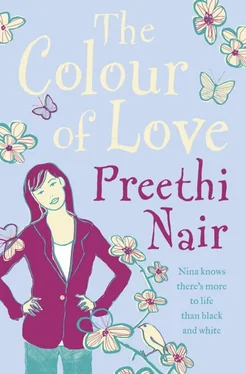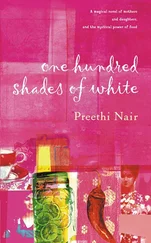‘I won’t, not until you tell me that –’
‘I’m marrying someone else,’ I blurted.
My mother looked at me, wiping her tears with the end of her sari.
‘His name is Raj and he’s an accountant,’ I continued.
Jean looked at me, incredulous. ‘The man in the car?’
I nodded. And then he walked away. And soon after I’d said it, I wanted to shout out, ‘Don’t go, Jean, it’s not true.’ But my mother had somehow managed to wrap herself around me and was weeping with delight.
Dad thankfully thought that Jean had fallen in love with me the day he had met me at the door. It was understandable, he said, as I got my looks from his side of the family. Mum said that we’d have to keep it all quiet so as not to disrupt the wedding plans. But then she would say that as she kept a lot of things quiet. And me, I called up Raj later that evening to ask him if he felt he might be lucky the third time around.
My dad was right: in life you can’t have everything you want – it was better to make it as pain-free as possible.
The next morning I woke up feeling very dazed, and for one moment I breathed a sigh of relief thinking that agreeing to marry an accountant and being an unemployed owner of a studio had been a nightmare. The moment I realised it was true, I wanted to smother myself with the pillow.
‘What a bloody mess, Ki, suppose you’re unable to help me out here?’
She would be laughing at the mess, telling me to get out of it and give Jean another chance, but it was too late – wedding plans were already being put into action.
My mum was like a contestant on The Price is Right who had just found out that her name had been called and was running down the steps in a state of delirious excitement. ‘Get up, beta, and go to work and then you can come home early,’ she said bouncing into my room. ‘We have so many plans to discuss, so many things to do. Come on, beta, we’ve done it, we’ve done it.’
She pulled back the duvet and I dragged myself into the shower. Part of my job was getting artists out of contracts that appeared watertight, but this was something else: verbal agreements in the semi were binding.
I got changed into my suit, pulled out my sports bag and packed a change of clothes, a few jumpers, a dirty pair of trainers, towels and an old bed-sheet. Should I be caught I was prepared with the answer of the forthcoming charity jumble sale that the firm were holding.
‘So you’ll try to come home early? We have the engagement party to think about.’
‘I don’t know, I might go to the gym after work,’ I replied as she was eyeing my sports bag.
‘But the party …?’
‘You just decide, Ma, call whoever you want. I’m running late.’
‘Thank you, beta, thank you. You have made me the happiest woman on this earth and you know –’
I left before she could finish.
It was freezing cold but it wasn’t raining. All the units adjacent to the studio were closed. Just outside the studio door was a grubby pair of boots. I put them to one side, unlocked the padlock and went in. The studio looked bare with no Sydney Harbours looking down over it and the emptiness heightened the absurdity of what I was planning to do. Blank canvases were stacked against the wall and one hung on the easel with a note. ‘Good luck with the birds – play the tape if you get stuck.’
I stood in the centre of the room looking up at the skylight. ‘You crazy, crazy woman, Nina, what have you gone and done? What are you thinking of?’ I said to myself. I changed out of my suit and into my jeans and jumper, tied my hair back and put the suit on the suit hanger. The heater was already turned on full blast. What was I supposed to paint?
Tubes of paint had been laid on the table in an orderly fashion. It wasn’t my natural inclination to be orderly but I had to be that way at the firm. I had to be a lot of things at the firm. I stared at the blank canvas for what seemed like hours, thinking about my family, Jean Michel, about Ki and the deep insecurities the Guru had touched. It was as if I were looking at myself in the mirror and seeing all the parts that hurt. I picked up the paintbrush with my right hand. I wasn’t even really right-handed but from being a child my dad had insisted on me using it, as in our culture it was considered bad manners to do anything with the left hand.
‘Chi, Chi, Chi, dirty girl. Not with that hand, Nina, what will the peoples say if they see you?’
But now I rolled up my sleeve and put the paintbrush in my left hand. All down my left arm was scarring, blotchy skin that revealed my deepest inadequacies. I could have had the prettiest face in the world but it wouldn’t have mattered; inside I felt ugly and worthless; inside was a gaping hole that had been left by the people I had loved the most. The Guru had found his way into that place and confirmed what I already believed. I heard his words again: ‘You’re cursed.’
This was the arm that I hid from everyone, that I tended not to look at. This was the arm I covered, pretending that everything was fine, but here in the confines of this space there was no deceiving myself – this was the arm I wanted to paint with. Nobody here was telling me what to do or how to do it; I could reveal everything about myself and nobody would judge me. I stared some more at the canvas and started to see black. The optical illusion of colour was like the optical illusion of life: stare at something hard enough and eventually you see what you want to see.
Blacks, that’s all I saw: black hole, black deceit, burning black, black at the funeral, empty black nights waiting for my sister to tuck me into bed, the Guru’s black teeth, his dirty black fingernails. Thick ivory black squirted from the tube directly onto the canvas. But there wasn’t a hint of ivory in this black, not one shade of another colour, and with the thickest, hairiest brush I frantically covered the entire canvas with this black.
I swept my hand across the meticulously placed paints and went to get the pair of grubby boots that I had seen outside. They looked so miserable – maybe they belonged to a tramp who had rejected them. They had no laces just holes as if they had been deeply wounded. I hurled them onto the table and watched them land defeated. One fell on its sole, the other on its side.
While the paint was still wet I took another black and smeared the paint on with my fingers. I could not stop. Molten anger bubbled to the surface as I pounded the canvas with my hand and fingers, smearing black onto black, trying to find the shape of the boots on the canvas. My hand and my arm ached but I kept on pounding frantically, finding the ugly creases and the lacklustre holes where laces didn’t even want to go through, until eventually I had to stop and sit on the floor.
When Ki left she took a huge part of myself with her, the part that made me believe I could be anyone or do anything, Jean Michel took away a bit more and what was on the canvas was the part that had stayed with me.
As I hoisted myself up to go and knock the boots off the table, a shaft of light reflected back from them, wanting to tell me something else.
I stared at the boots in this light. They had walked for miles and miles and had been bought at a time when people saved up to buy things for special occasions. Maybe a man had saved up for weeks to buy them for his wedding and had proudly walked down the aisle. He’d also kicked a football in them with his son. When they had been chucked out years later, he searched all over the house and every subsequent pair he bought was in a vain attempt to replicate those cherished boots.
Perhaps a woman in a charity shop had picked them out just before they were put on display for the customers. She felt that they would fit her husband and had bought new laces that matched. Polishing and wrapping them up in newspaper, she had handed the boots to her husband, swearing it was a stroke of luck that she had found them as it wasn’t her turn to empty the bags that day. Shortly after that he was promoted. He would have wanted to be buried in his boots when he died but his son hadn’t known that and they were discarded along with the rest of his belongings.
Читать дальше












